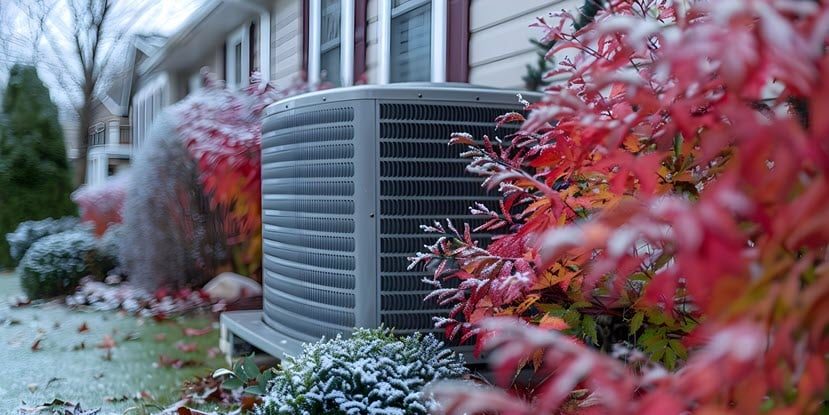Sharing is Caring!
A home’s HVAC system plays a bigger role in resale value than many sellers realize and how it can optimize your home’s climate. Beyond heating and cooling, HVAC upgrades can influence buyer confidence, speed up offers, and even reduce tough negotiations, making it a hidden factor in how smoothly (and profitably) a sale goes.
A few years ago, I had my entire HVAC system replaced as it was about 20 years old. Not only did doing that increase my home’s value, but it made my home’s climate run more effecietnly and comfortable.
Disocver why your home’s HVAC system is key in your home’s resale value below.
Does A New HVAC System Increase Home Value?
It is not just in the “sticker price” sense. A new HVAC system signals to buyers that the home has been well cared for and that they won’t face a surprise $8,000-$15,000 replacement cost right after closing.
Even if the exact appraisal bump varies, the perception of “move-in ready comfort” often translates into faster offers, fewer negotiations, and sometimes multiple bids.
In real estate, time on market can be just as valuable as the final selling price, and this is where updated HVAC systems make the biggest impact. In many cases, the impact of HVAC on home value is felt more in buyer psychology than on paper appraisals. I asked the same questions when it was time to replace mine.
Realistically, it was a scary time for me because the expense was more than I anticipated and expected. Moreover, the end result was amazing and now my home’s climate is always on target and comfortable.
Appraisers may only assign a modest bump, but realtors consistently report that homes with new systems attract buyers more quickly.
A house that feels “turnkey” gives a psychological edge.
Furthermore, it pushing buyers to bid faster and more competitively. Instead of lowball offers where buyers try to shave $15k off the asking price, sellers often see stronger, cleaner offers, because the system removes a major point of leverage in negotiations. This shows that the value HVAC upgrades provide is both financial and emotional.
How Much Does A New HVAC System Increase Home Value?
There isn’t a single dollar amount that fits every market, but research and realtor. Moreover, surveys suggest sellers may recoup 50%-70% of the system’s cost in added value, with higher bumps in hot or humid regions where cooling is essential.
Furthermore, the bigger financial win, though, often comes from reduced price haggling.
Buyers who see a 15-year-old HVAC almost always request a concession or lower offer, often $10,000-$20,000 below asking, even when replacement wouldn’t actually cost that much. This reinforces the impact of an HVAC system on home value as a negotiation tool.
The real issue is closing the expectation gap. Buyers tend to overestimate the expense of HVAC replacement and underestimate the disruption of installation. So even if a system would cost $8k to replace, they may mentally subtract $15k-$20k from their offer. Installing HVAC before listing allows sellers to control the narrative instead of letting buyers imagine worst-case scenarios.
Ideally, this means the value HVAC improvements deliver shows up both in appraisals and in avoided discounts.
Impact of HVAC on Home Value: Why Buyers Care
Comfort and costs are two of the biggest unknowns when buying a home. Buyers know they can repaint walls or swap out light fixtures easily, but an HVAC replacement feels daunting, expensive, and disruptive. A new system addresses that uncertainty all at once: it signals lower energy bills through better efficiency, removes the worry of a looming big-ticket repair, and ensures reliable heating, cooling, and air quality from the start. In this way, the impact of HVAC on home value is closely tied to peace of mind.
Because HVAC isn’t “optional comfort” but a daily utility, it affects every wake-up, every night’s sleep, and every utility bill.
Unlike a luxury feature such as a pool, it’s the backbone of livability. That’s why, even if it doesn’t photograph well in a listing, realtors recognize it as one of the hidden deal-makers during home tours and inspections. In practice, this is another sign of the value HVAC systems add to real estate transactions.
More so, it’s essential to maintain your HVAC system with seasonal checks. This is key in keeping your system optimized.
Impact of HVAC on Home Value: Key Factors
Several factors shape how much value a new HVAC system adds.
Local climate plays a major role, AC capacity matters far more in Arizona or Florida than in Maine. System type also influences appeal, since heat pumps, variable-speed technology, and smart integrations are more attractive than older single-stage units.
Typically, energy efficiency ratings carry weight as well, with higher SEER2 and ENERGY STAR equipment drawing stronger buyer interest. In each case, the impact of HVAC on home value is amplified when these features are present.
Documentation can make a difference too, as proof of professional installation, warranties, and service records build credibility and trust. The home’s price point shapes expectations: in higher-end properties, modern HVAC is a baseline, while in mid-range homes it can serve as a real differentiator.
Similarly, market segment matters, what feels like a premium upgrade in a starter home is simply expected in the luxury market.
These differences highlight how value HVAC is perceived in different price brackets.
Trends and buyer priorities also play a part. Eco-conscious buyers are especially drawn to energy-efficient systems, a demand that continues to grow. At the same time, evolving regulations mean older systems risk being viewed as outdated more quickly, while utility incentives and rebates make new equipment even more appealing by lowering long-term costs.
Value HVAC: Which Upgrades Attract Buyers Most?
Buyers are especially drawn to upgrades that combine efficiency with convenience. High-efficiency heat pumps are seen as eco-friendly and cost-saving, while zoned systems or ductless mini-splits offer control and flexibility.
Smart thermostats, though a relatively small addition, send a strong signal of a “modern home.”
Improved filtration and indoor air quality systems have also gained importance, especially post-pandemic, as buyers increasingly prioritize healthier living environments. These preferences underscore the value HVAC upgrades deliver in today’s housing market.
Beyond efficiency ratings, what really stands out are upgrades that reduce future hassles. Transferable warranties provide peace of mind after closing, and smart home integrations fit the growing lifestyle trend of controlling everything from a phone.
Whole-home dehumidifiers, HEPA filtration, and UV lights go beyond heating and cooling by highlighting a home’s commitment to health-conscious comfort. By contrast, simply swapping an old unit for another low-efficiency model is unlikely to impress buyers or add to the impact of HVAC on home value in any significant way.
Impact of HVAC on Home Value vs.
Other Upgrades
HVAC tends to deliver a solid, mid-range ROI. It usually outperforms luxury upgrades like a gourmet kitchen remodel, which rarely recoups its cost, but falls below highly visible curb-appeal projects such as new garage doors or front doors.
The key difference is that HVAC isn’t glamorous, but it is practical and essential. A buyer might compromise on countertops, but not on year-round comfort. This dynamic emphasizes the unique value HVAC brings compared to other home improvements.
That’s because HVAC occupies a unique space, it’s invisible but indispensable.
Buyers don’t fall in love with ductwork the way they do with a remodeled kitchen, yet they’ll walk away from a house that feels stuffy, unevenly cooled, or noisy.
Compared to flashier remodels, HVAC’s return comes less from obvious appraisal adjustments and more from instilling buyer confidence. It’s the silent closer: nobody brags about it, but everybody cares. This reality explains the lasting impact of HVAC on home value across different markets.
Value HVAC: Is a New System Worth It Before Selling?
Whether upgrading makes sense depends largely on your system’s age and condition. If the HVAC is 10-15 years old or unreliable, replacing it is often worth it; buyers will notice and subtract heavily from their offers, and nothing derails negotiations faster than an inspection report stating the system is on its last legs.
By contrast, if it’s newer and well-maintained, you may not need a full replacement, servicing it, cleaning ducts, and highlighting efficiency can be enough.
Providing maintenance records or even offering a home warranty also reassures buyers without the full upfront cost. This is a cost-effective way of showing value HVAC without a full replacement.
In hotter climates and competitive real estate markets, a new system can make your listing stand out as “low-maintenance,” which often translates into more competitive offers.
Even if you don’t recover the full installation cost in appraised value, the payoff usually comes in negotiation power and speed of sale. And when viewed broadly, the impact of HVAC on home value becomes less about a precise dollar figure and more about overall buyer perception.
Now, with a new HVAC system in my home, I feel confident that when it’s time to sell, my home’s value will increase and my comfort level, renewed!
Sharing is Caring!
Disclaimer: This story is auto-aggregated by a computer program and has not been created or edited by jennertrends.
Publisher: Source link













